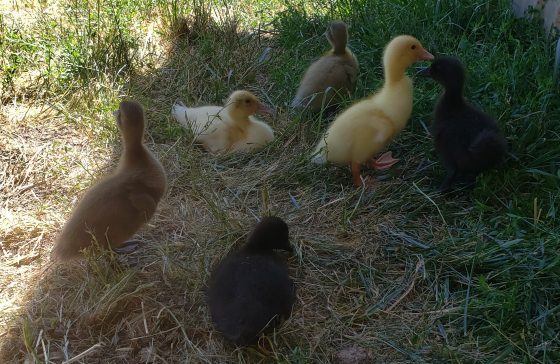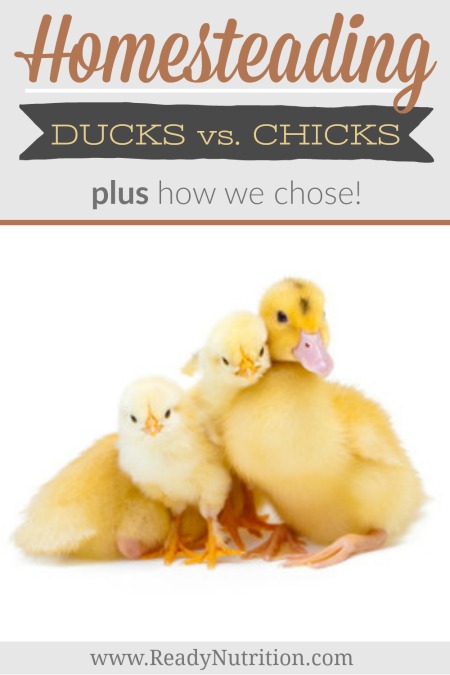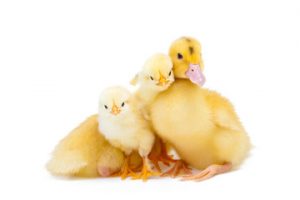Some people will be able to have both ducks and chickens on their homestead with no trouble whatsoever. We really wanted to raise a flock of something though for the eggs, and eventually made the decision to raise ducks. This is our story of how and why we ended up with 6 ducks and zero chickens.
There were several reasons for our decision, and honestly, right up until the afternoon we bought two ducklings from the closest Tractor Supply, we had still planned to get a dozen chickens in the spring. But just getting those first two little ducks changed our minds and made us “duck people.”
PETS
Originally, we only wanted the ducks to be pets and we were only wanting two. Our children have been wanting ducklings since the first time they saw them at Tractor Supply last year as I shopped for dog food and cat food. When we finally bought them their ducks on the first Saturday in August, we listened to the instructions from the lady who put the cute ducklings in the box and got all of the things we needed to care for them. It wasn’t too expensive, but we already had a “duck house” built on the property and a heat lamp. We simply put up some screws to hold the heat lamp down low, added some pine flakes, some water, and some food and viola! The pet ducklings had a place to live.
Since these were pets, our kids named their ducks (Wiggles and Moose) and we knew we were not going to eat their pets, so the meat was not a factor in our decision to raise ducks. Once we saw just how much the kids loved those squirmy little birds, my husband and I took to Google to find out more about these guys. As it turns out, ducks make great pets! In fact, two days after getting the ducks, my son was holding his duck, Moose. As it fell asleep in his hands, the dog snatched it from him, killing it. The heart-wrenching scream that came from my six-year-old was like nothing I had ever heard. He honestly loved that duck like it was a dog or a cat. I immediately got on the phone with Metzer Farms in Gonzales, California [1] to order my son another duck because Tractor Supply was sold out.
Oddly enough (or luckily enough depending on how it’s looked at), we had already decided to get four more ducks and increase our flock to 6 once Tractor Supply got another shipment in. Unfortunately, it was faster (albeit more expensive) to order 6 ducklings from Metzer Farms. I placed the order at around 10 am on a Monday and on Wednesday at 6 am, I got a call from the local post office that the ducklings were in and to come to pick them up.
We got a female white Pekin that looked similar to my daughter’s duck, Wiggles, two Cayugas, a Khaki Campbell, and a male and female blue Swedish. Unfortunately, we lost the male blue Swedish. He just never developed or ate or drank. He’s buried next to Moose. But in addition to making great pets for the kids, the ducks have several other advantages for us, personally.

EGGS
Duck eggs are larger and more nutritious than chicken eggs. They are higher in Omega 3 fatty acids and the yolk to white ratio is also higher, boosting a higher calorie content. Bakers say that using duck eggs as opposed to chicken eggs in baking gives cakes and cookies a “richer” flavor and fluffier pastries due to the extra albumen. They are bigger eggs too: two duck eggs will equal about three chicken eggs. If you want to get more protein in your diet, the duck egg edges out the chicken egg once again. An average chicken egg [2]contains 6.28 grams of protein, while an average duck egg contains 8.97 grams of protein.
Ducks will lay eggs all year long, even in the winter, if you give them enough light. Ducks have routine egg-laying hours and produce eggs for many more years than chickens making them more economical if you are going to eat the eggs, and once ours start to lay, we will be eating them for sure. Ducks normally lay their eggs between 4:00 a.m. and 8:00 a.m. daily. This means they lay their eggs in the nests in their night pens instead of hiding a nest in the yard. You can pick up the duck eggs just once per day, at the same time that you let the ducks out to forage – and that brings us to our next advantage…
FORAGING
Ducks are much better foragers than chickens and can keep your vegetable garden slug free! Chickens can definitely help with pest control in yards, gardens, and pastures under certain circumstances. But chickens don’t eat big slugs or snails as ducks do. Because ducks forage a larger portion of their diet than chickens, they can really be economical to own, especially in the summer when they won’t need as much food.
For these reasons, we decided to “scratch” the chicken idea and stick with ducks. But there are some advantages to choosing chickens too.
CHICKEN ADVANTAGES
Chickens do come with their pros, and they may be a better choice for others than they were for us. Chickens are more readily available, and usually cheaper to purchase. They are a better “confinement animal”, which is an important factor if space is an issue. They don’t desire as much free space to roam around.
The thicker shell on a duck egg makes it harder to crack and getting a clean break to cook or bake with duck eggs takes practice and patience. Duck eggs will be harder to whip than chicken eggs because of the lower water content.
What about you? Ducks, chickens, or both? Let us know in the comments!

